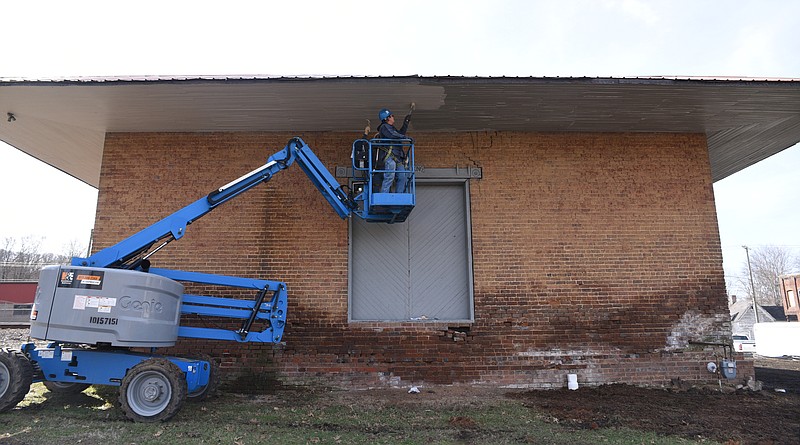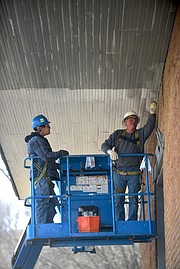NIOTA, Tenn. - After dodging demolition two years ago, the 163-year-old railroad depot in Niota is undergoing repairs and renovations to return the pre-Civil War building to its former glory.
Crews have been at work since early December and last week were repainting the exterior soffits and digging for drainage improvements, Niota Mayor Lois Preece said.
The work was expected to begin in September and wrap up in February, but the project's completion date has been moved to mid-April, Preece said.
The restoration was partially funded through an initial $182,000 Tennessee Department of Transportation grant awarded in 2015 to deliver the depot from the wrecking ball.
Preece said officials asked TDOT for a little more help and grant funding was boosted to $196,800. The grant included a 20 percent local match, funded by the McMinn County Commission. Any other costs are being borne by the town's depot committee, Preece said.
In 2015, the depot was listed on the Tennessee Preservation Trust's 10 most endangered historic properties in the state because a chimney collapse that caused city offices to be closed possibly invited condemnation and demolition. The depot also made the list of most endangered structures in 2009.
But the move toward preservation stopped talk of tearing it down.
The Niota Depot is the oldest standing depot in Tennessee and the only surviving Civil War-era depot along the East Tennessee and Georgia Railroad line, according to officials and historical information posted on the property.
Called "Mouse Creek" in 1858, the community that would become Niota first appeared in official war records when a Union spy reported that a Confederate company was stationed there in January 1862, according to historical information posted on the depot property. Union Gen. Ambrose E. Burnside occupied East Tennessee in September 1863 and troops later occupied the rail line, including Mouse Creek.
The little depot was garrisoned by artillery units at times and was unique in that its brick structure meant timber fortifications against attack were unnecessary. On the front and back of the building, soldiers removed bricks to create gun ports for defending it.
Although Confederate troops in the last year of the war tore up the tracks for miles north and south of Mouse Creek, the depot remained in Union hands until the war ended. Company C, 1st Wisconsin Heavy Artillery stayed at the depot until July 1865.
History almost literally seeps from the wooden walls inside the depot, especially in the large baggage room where people scrawled their names in the mid- to late 1800s and early 1900s. There are several references to "Mouse Creek," and some appear to have been left by Civil War soldiers.
Preece, a native of upstate New York who became a teacher at Niota Elementary School in 1975, fell in love with the depot and its hometown more than four decades ago.
"I really feel connected to this community," she said, noting the depot has been a centerpiece of the town throughout its history.
"It's been a great historical building. It's something that I always show my family when they come in; to show them that we can preserve history in the South," Preece said.
Preece said the depot committee hopes to raise money for other work and updates on the building and grounds with the Fried Green Tomato Festival, held each of the last five years in front of the depot on the Saturday after Labor Day. The festival this year will be on Sept. 9.
Contact staff writer Ben Benton at bbenton@timesfreepress.com or 423-757-6569.

